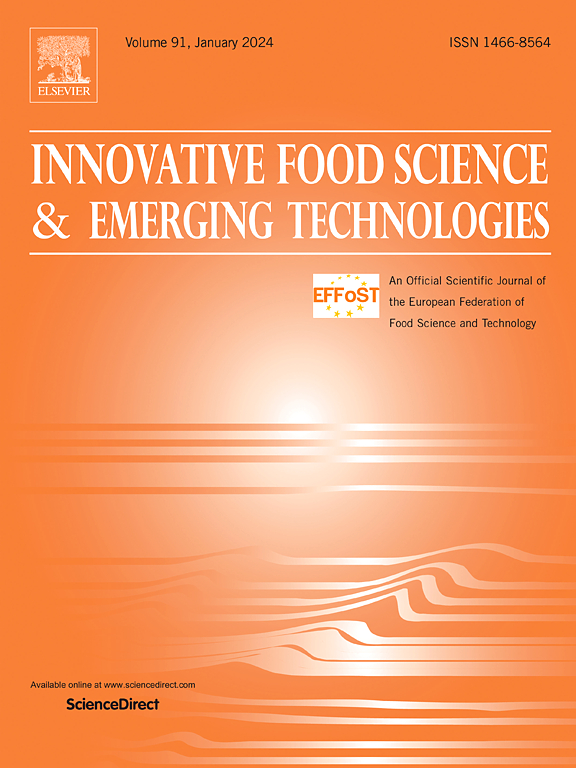Mechanism insights into the changes in activity and structure of cellular alcohol dehydrogenase in Acetobacter sp. after pulsed electric fields treatment
IF 6.3
1区 农林科学
Q1 FOOD SCIENCE & TECHNOLOGY
Innovative Food Science & Emerging Technologies
Pub Date : 2024-09-22
DOI:10.1016/j.ifset.2024.103826
引用次数: 0
Abstract
Pulsed electric fields (PEF) can affect enzyme activity in fruit and vegetable juice, but its effect on microbial cellular enzymes has not been fully revealed. Alcohol dehydrogenase (ADH) is a key cellular enzyme of Acetobacter sp. to convert alcohol to acetic acid by metabolism. In this study, the effect of PEF treatment on the ADH activity of Acetobacter sp. and the structural changes of the enzyme were systematically investigated. The results showed that the activity of cellular ADH in Acetobacter sp. was decreased by PEF treatment. The α-helix structure of ADH molecules decreased and the random coil structure increased, indicating a change in secondary structure. The tertiary structure of ADH was expanded and the microenvironment of aromatic amino acid residues was changed, while the primary structure of molecules remained intact. In conclusion, the decrease of ADH activity after PEF treatment may be caused by the transformation of spatial conformation.
脉冲电场处理后醋酸菌细胞醇脱氢酶活性和结构变化的机理启示
脉冲电场(PEF)可影响果蔬汁中酶的活性,但其对微生物细胞酶的影响尚未完全揭示。乙醇脱氢酶(ADH)是醋酸杆菌通过新陈代谢将酒精转化为醋酸的一种关键细胞酶。本研究系统研究了 PEF 处理对醋酸杆菌 ADH 活性的影响以及该酶的结构变化。结果表明,PEF 处理会降低醋酸杆菌细胞 ADH 的活性。ADH分子的α-螺旋结构减少,随机线圈结构增加,表明二级结构发生了变化。ADH 的三级结构扩大,芳香族氨基酸残基的微环境发生了变化,而分子的一级结构保持不变。总之,PEF 处理后 ADH 活性降低可能是由于空间构象发生了变化。
本文章由计算机程序翻译,如有差异,请以英文原文为准。
求助全文
约1分钟内获得全文
求助全文
来源期刊
CiteScore
12.00
自引率
6.10%
发文量
259
审稿时长
25 days
期刊介绍:
Innovative Food Science and Emerging Technologies (IFSET) aims to provide the highest quality original contributions and few, mainly upon invitation, reviews on and highly innovative developments in food science and emerging food process technologies. The significance of the results either for the science community or for industrial R&D groups must be specified. Papers submitted must be of highest scientific quality and only those advancing current scientific knowledge and understanding or with technical relevance will be considered.
文献相关原料
公司名称
产品信息
上海源叶
Alcohol dehydrogenase (ADH)

 求助内容:
求助内容: 应助结果提醒方式:
应助结果提醒方式:


